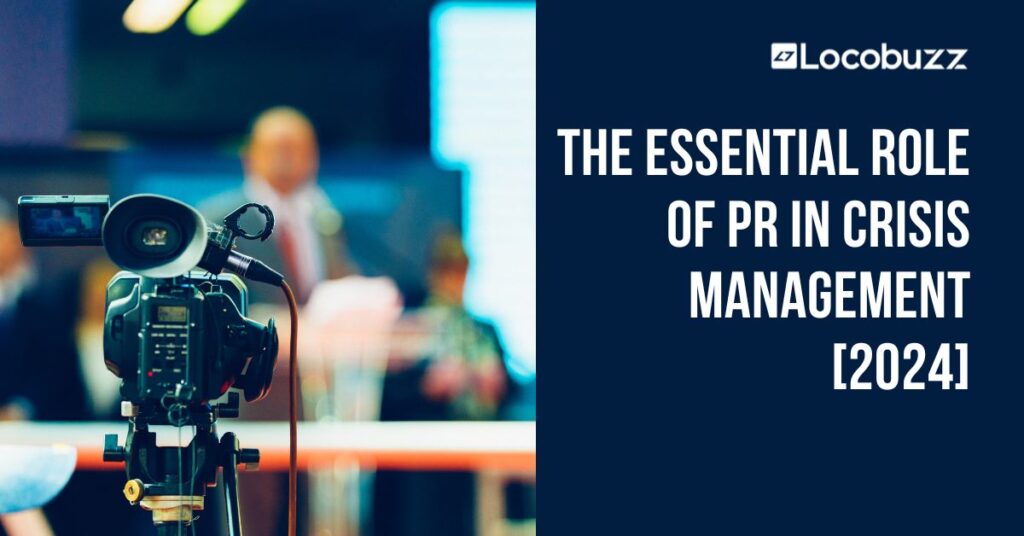The Essential Role of PR in Crisis Management [2024]

PR crisis management is a vital function within organizations, intervening during product failures, social media backlash, or scandals linked to the business or its brands. It’s crucial for navigating these situations, minimizing damage, and ensuring timely communication, as recognized by the Institute for PR.
This management process involves a series of procedures aimed at preventing or mitigating damage from unexpected events threatening the company’s operations or reputation. Its primary aim is damage control, demonstrating accountability, and safeguarding the brand’s reputation. A company’s reputation heavily relies on its public image, but unforeseen circumstances can tarnish it.
Crises can affect enterprises of all sizes. Effective crisis management can prevent reputational destruction, with an experienced PR team minimizing damage to a brand’s reputation. If a brand is already active in public relations, damage can be rapidly repaired as the brand and its spokesperson are known. However, brands lacking PR experience can swiftly restore credibility by hiring a professional to construct an effective image. Public relations are pivotal in crisis communication.
Why is PR important for crisis management?
PR is crucial because unforeseen events can create unwanted news, notoriety, and social media mentions for your company, even if it’s not your fault. Online reputation management (ORM) supplements your in-house team, providing access to independent specialists who can help keep the public informed through various channels.
PR is vital for developing crisis management strategies, identifying spokespeople, selecting communication channels, and analyzing audience comments during crises. It involves foreseeing potential situations and developing reaction strategies. A crisis plan is essential to stay ahead of issues, instructing staff on what not to say or do to avoid problems. It helps companies respond eloquently and precisely, anticipating twists and turns.
PR crisis management is essential for various reasons:
Protects brand reputation: A brand’s reputation is its most valuable asset. In times of crisis, misinformation and negative publicity can spread rapidly, tarnishing the brand’s image. PR crisis management steps in swiftly to address these issues, preventing prolonged damage. By actively managing the narrative and responding effectively, the PR team can help maintain the brand’s reputation and credibility in the eyes of consumers, stakeholders, and the public.
Maintains stakeholders’ trust: Trust is the foundation of any successful business relationship. During a crisis, stakeholders, including customers, employees, investors, and partners, may become concerned about the company’s ability to navigate the situation. Having a crisis management plan in place reassures stakeholders that the company is prepared to handle challenges and emerge stronger. By demonstrating transparency, accountability, and a commitment to resolving the issue, the company can preserve trust and confidence, mitigating potential long-term damage to relationships and partnerships.
Minimizes financial repercussions: Crises can have significant financial implications for a company, ranging from decreased sales and revenue loss to legal fees and damage control expenses. PR crisis management plays a crucial role in mitigating these financial repercussions by containing the damage to the brand’s reputation. By addressing the crisis effectively and preventing further escalation, the company can minimize the need for costly repairs and future expenses associated with rebuilding its image and regaining consumer trust.
Ensures effective communication: Effective communication is essential during a crisis to manage the flow of information, address concerns, and maintain control of the narrative. PR crisis management helps establish clear lines of communication with the media, stakeholders, and the public, ensuring that accurate information is disseminated promptly. By proactively addressing rumors, misinformation, and inaccuracies, the company can protect its reputation and prevent the spread of damaging narratives. Effective communication also provides a competitive advantage by positioning the company as transparent, responsive, and trustworthy in the eyes of consumers and stakeholders.
Enables swift recovery: While crises can be damaging, they also present an opportunity for growth and resilience. PR crisis management facilitates the company’s recovery process by implementing strategies to rebuild its brand image and reputation post-crisis. This may involve initiatives such as enhanced online reputation management, proactive communication with stakeholders, and implementing lessons learned to prevent similar incidents in the future. By taking swift and decisive action, the company can emerge from the crisis stronger and more resilient, restoring consumer confidence and positioning itself for long-term success.
In essence, PR crisis management is invaluable for maintaining both external image and internal well-being during turbulence.
How does PR contribute to effective crisis management:
Dealing with the media: One of the primary responsibilities of PR during a crisis is to manage media interactions. PR professionals ensure that the narrative is controlled and adjusted appropriately, and that the spokesperson is well-prepared to handle media inquiries. Dealing with the media can be challenging, especially during a crisis, but PR provides a solid foundation to navigate these interactions smoothly. PR also offers guidance on responding to negative media coverage, providing a step-by-step approach to managing the situation.
Building a strategic narrative: PR specialists develop a strategic plan to control the narrative surrounding the crisis. This involves crafting a compelling story that presents the company in the best possible light and addresses concerns effectively. By understanding the problem and leveraging appropriate messaging, PR helps minimize negative perceptions and counteract rumors and misinformation. A well-crafted narrative helps the company regain control of the situation and manage public perception more effectively.
Garnering support and rebuilding reputation: PR plays a crucial role in garnering support and rebuilding the company’s reputation in the aftermath of a crisis. PR professionals engage with influencers and stakeholders who can advocate for the brand, providing endorsements and positive testimonials. They create press releases, interviews, and authored articles to showcase the company’s perspective and efforts to address the crisis. By focusing on transparency, accountability, and corrective actions, PR helps restore trust and confidence in the brand. This phase also involves learning from mistakes, implementing improvements, and using the crisis as an opportunity to build a stronger brand image.
Steps for Effective PR crisis management:
Form a Response Team Proactively: Rather than waiting for a crisis to occur, it’s essential to proactively assemble a dedicated response team comprising individuals with the necessary expertise and authority to manage crises effectively. This team should include representatives from relevant departments, such as communications, legal, public relations, and senior management. By forming the team in advance and providing them with appropriate training and resources, you can ensure a swift and coordinated response to any crisis that arises. Additionally, having a pre-established response team allows for better communication, decision-making, and execution during times of crisis, minimizing confusion and maximizing effectiveness.
Assess and Classify the Issue: Before responding to any negative remark or event, it’s imperative to conduct a thorough assessment to understand the nature and potential consequences for your company’s reputation. Not every criticism or incident warrants the same level of response. By carefully evaluating the severity, scope, and context of the issue, you can determine whether it constitutes a minor concern, a significant challenge, or a full-blown crisis. This assessment allows you to prioritize resources and responses accordingly, ensuring a measured and strategic approach to crisis management.
Swift Action is Key: Time is of the essence in crisis management. Once a potential crisis is identified, immediate action is necessary to address and mitigate its impact. Delaying a response can allow the situation to escalate, leading to greater damage to your organization’s reputation and credibility. Swift action demonstrates your organization’s commitment to transparency, accountability, and proactive management of issues. It reassures stakeholders that you are actively engaged in addressing the situation and seeking resolution, which can help minimize negative perceptions and restore trust.
Empower Your First Response Team: Frontline employees, such as customer service representatives and social media managers, are often the first to encounter PR issues. It’s essential to provide them with the necessary training and resources to identify and address these issues effectively. Clear communication channels and defined protocols ensure that the first response team can act decisively in the face of a crisis. By empowering them with the knowledge and tools they need, you enable them to respond promptly and appropriately, minimizing the impact of the crisis.
Develop a Comprehensive Action Plan: Based on the assessment, develop a detailed action plan outlining steps for addressing the crisis. This plan should include clear objectives, roles, responsibilities, and timelines. Transparency and honesty should guide your communication strategy throughout the process, ensuring that stakeholders are kept informed and updated on developments. A comprehensive action plan provides a roadmap for navigating the crisis and helps maintain focus and direction during challenging times.
Collaborate on Strategy Development: Crisis communication is a team effort that requires collaboration and coordination across various departments and stakeholders. Work together with the response team to develop a cohesive strategy that aligns with organizational goals and values. This strategy should outline communication protocols, messaging guidelines, and escalation procedures to ensure a unified and consistent response. By involving key stakeholders in the planning process, you can foster alignment and cooperation, enhancing the effectiveness of your crisis management efforts.
Leverage Influencers and Public Figures: Influencers and public figures can play a significant role in shaping public perception during a crisis. Identify individuals who have a strong presence and credibility in your industry or target market and collaborate with them to amplify positive messaging and counteract negative publicity. By leveraging their influence and support, you can bolster your organization’s reputation and credibility, helping to mitigate the impact of the crisis.
Craft a Transparent Response: Transparency and honesty are essential principles in crisis communication. Craft your response in a clear and straightforward manner, acknowledging any mistakes or shortcomings. By taking ownership of the situation and outlining concrete steps for resolution, you can rebuild trust and credibility with stakeholders. A transparent response demonstrates accountability and integrity, laying the foundation for effective crisis management and recovery.
Conduct Post-Crisis Analysis: Once the crisis has been resolved, take the time to conduct a thorough analysis of your response efforts. Identify what worked well and areas for improvement, and use these insights to strengthen your crisis management capabilities. By learning from your experience, you can better prepare for future challenges and enhance your organization’s resilience and readiness to handle crises effectively.
Monitor the Situation Continuously: Crisis management is an ongoing process that requires continuous monitoring and adjustment. Stay vigilant for any new developments or emerging challenges, and be prepared to adapt your strategy accordingly. Maintain open lines of communication with stakeholders and stakeholders and stay proactive in addressing any issues or concerns that arise. By staying proactive and responsive, you can effectively manage the crisis and minimize its impact on your organization’s reputation and operations.
Final Thoughts
In conclusion, the importance of PR crisis management cannot be overstated in today’s fast-paced and interconnected world. At its core, PR crisis management involves a series of procedures aimed at preventing or mitigating damage to a company’s operations or reputation. Its ultimate objective is damage control, demonstrating accountability, and safeguarding the brand’s reputation.
In an era where a company’s reputation is heavily influenced by its public image, the ability to effectively manage crises can make or break an organization. Regardless of the size of the enterprise, crises can strike at any time, posing significant risks to its reputation and bottom line. However, with the guidance of an experienced PR team, the potential for reputational destruction can be minimized. Brands that have already established a presence in public relations have an advantage, as they can swiftly repair any damage with the help of their existing network and spokesperson.
For brands lacking experience in PR, hiring a professional to construct an effective image and restore credibility is crucial. Public relations professionals play a vital role in crisis communication, helping organizations navigate through turbulent times and emerge stronger on the other side. By proactively addressing crises and communicating transparently with the public, organizations can weather even the most challenging storms and emerge with their reputation intact.
Navigate crises seamlessly with Locobuzz!






















